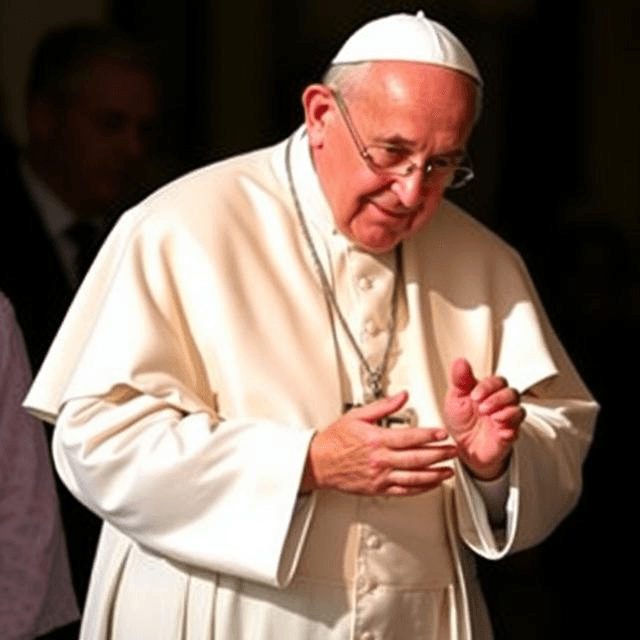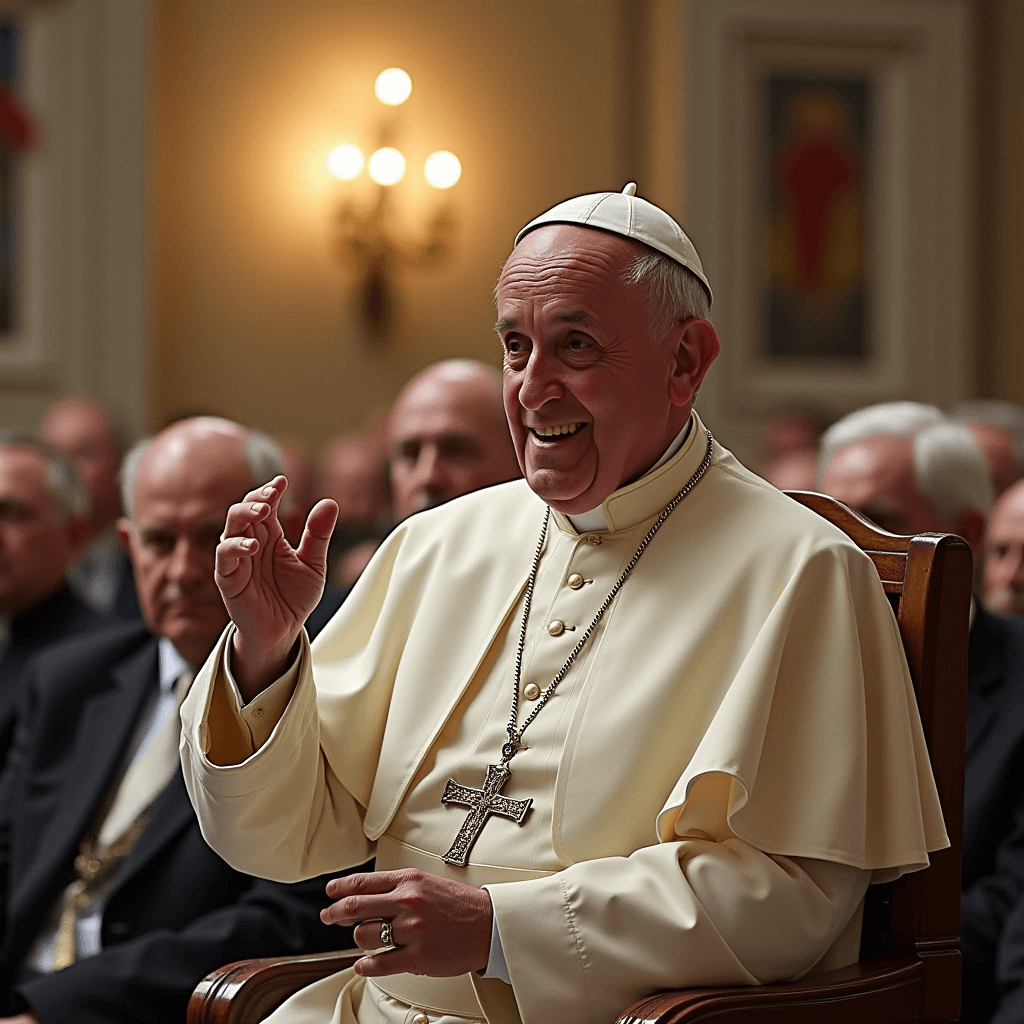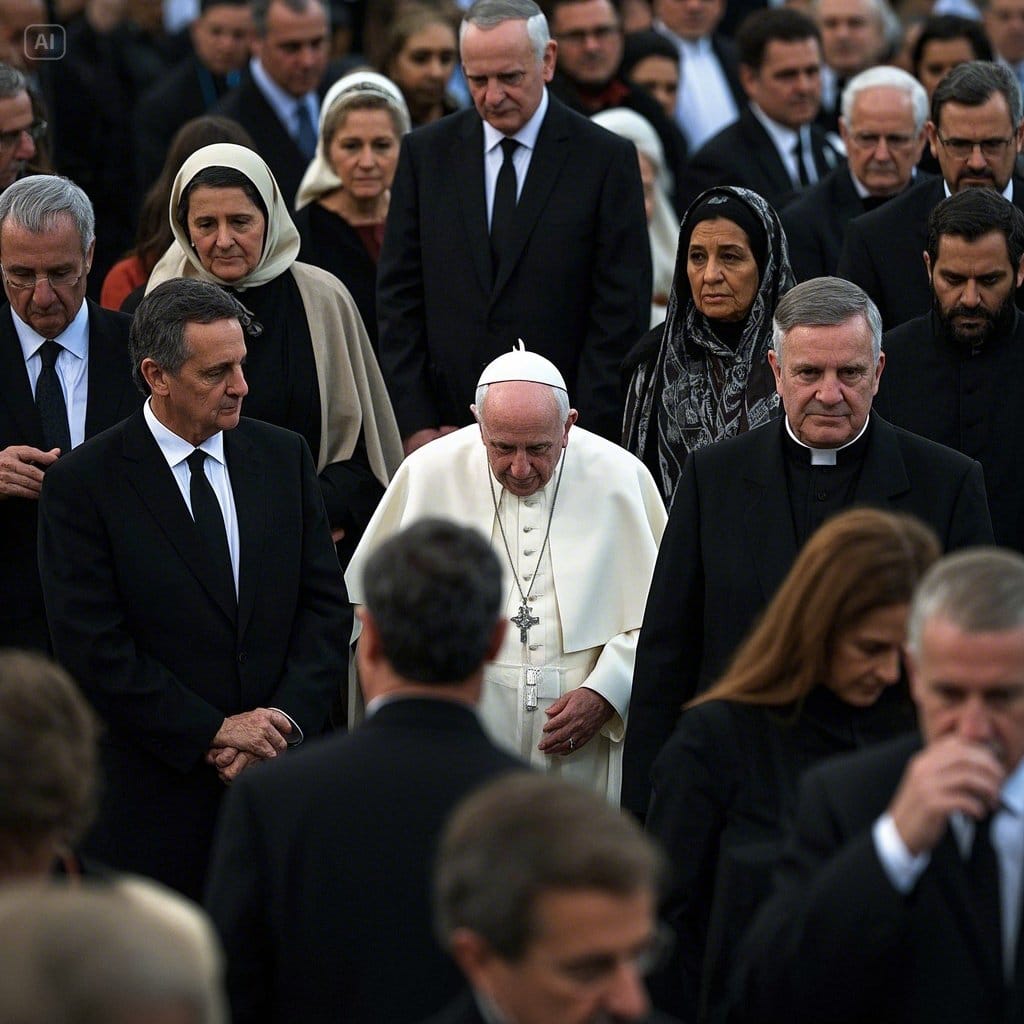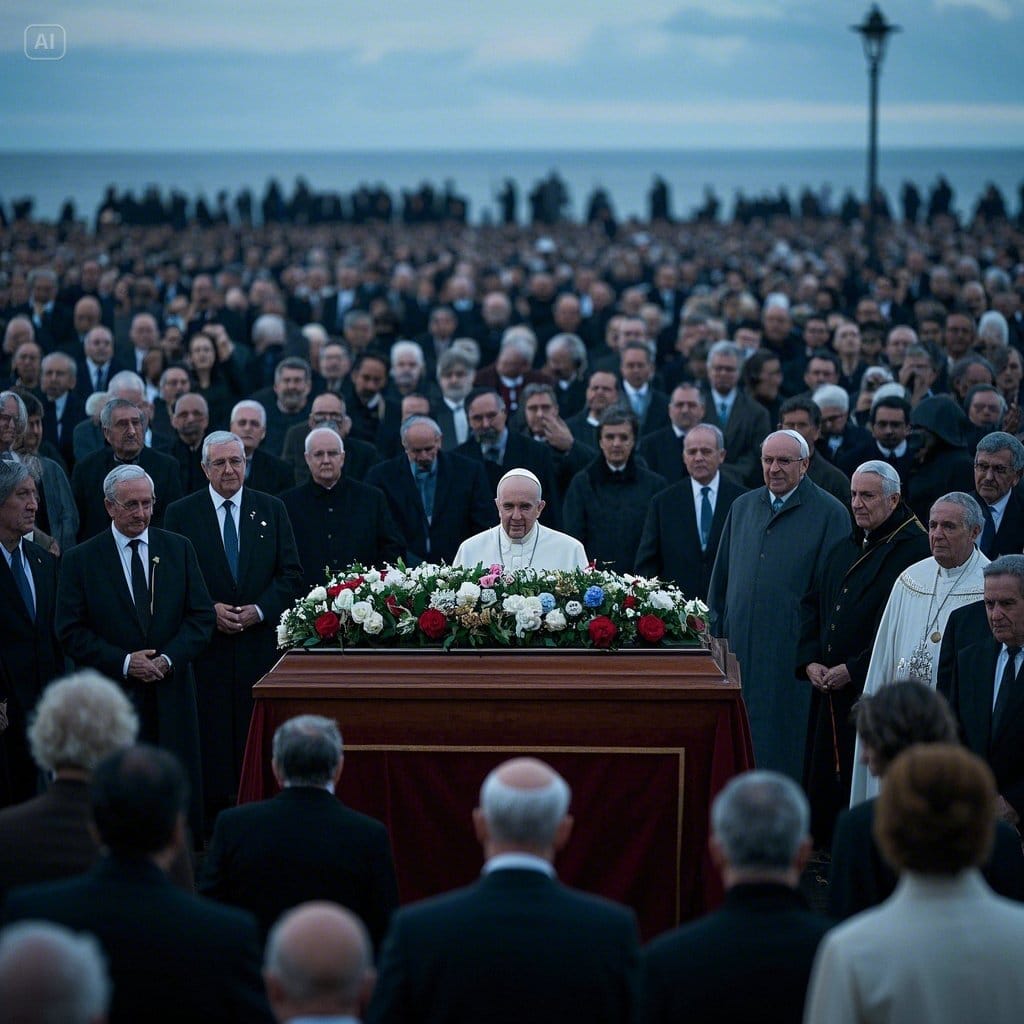Pope Francis’s Death: The Big 1st Spiritual Community Impact

Pope Francis, the first Latin American and Jesuit pope in history, died at 88, leaving a profound effect on spiritual practices worldwide. His death concludes a transformative 12-year papacy that changed our understanding of spiritual leadership. Church bells toll in mourning across the globe as people remember how his humility and focus on social issues touched countless lives. He redefined religious leadership through his work serving marginalized communities, protecting the environment, and promoting peace in conflict zones. His steadfast dedication to pastoral renewal and his work with society’s overlooked communities proved significant to revitalize the Church’s mission and strengthen its connection with modern challenges.
World Reacts to Pope Francis’s Death with Spiritual Mourning
The world mourns as news of Pope Francis’ death reaches Catholics and non-Catholics everywhere. People’s spiritual response shows both in traditional ceremonies and never-before-seen displays of unity between faiths. This reflects the special place this pope held in today’s religious world.
Church bells toll across continents
Church bells have become everyone’s voice of grief, from Vatican City to small parishes in the Andes Mountains. Thousands of faithful gathered at St. Peter’s Basilica in Rome when they heard the news, as bells began their solemn toll. The cathedral bells in Buenos Aires, Francis’ hometown, rang in a special sequence saved only for when popes die. This connected his birthplace to his final home through sound.
Historic churches throughout Europe joined in. Paris’ Notre-Dame Cathedral used temporary bells to honor the pope who had prayed for its rebuild after the 2019 fire. Eastern Orthodox churches also joined the mourning, which shows how well Francis worked to improve Catholic-Orthodox relationships.
The spiritual impact reached unexpected places. Churches in Havana, Cuba got special permission to ring their bells longer than usual, remembering how Francis helped restore relations with the United States. In Jerusalem, the Church of the Holy Sepulcher’s bells rang together with Muslim calls to prayer, showing the bridges Francis built between faiths.
The bell-ringing means more than just tradition to many believers. “This ancient ritual helps heal the soul through community,” a Vatican spokesperson explained about how mourning together helps people deal with grief. These sounds both spread the news and offer a chance to think about life, death and legacy.
Global leaders and faith groups issue tributes
World leaders’ tributes go beyond the usual diplomatic messages. They focus on Francis’ spiritual influence instead. The UN Secretary-General praised Francis because “he showed that spirituality isn’t just about theory – it’s about taking action for everyone’s good.” Leaders from more than 100 countries plan to attend his funeral. Many say their meetings with the pope changed them personally.
Faith leaders from different religions have pointed out how Francis made spirituality mean more than just following rules. The Dalai Lama wrote a touching tribute calling Francis “a brother who knew that spirituality means acting with compassion, not just following rituals.” The Grand Imam of Al-Azhar praised how Francis showed religious leaders could use spiritual wisdom to help with today’s problems.
Religious experts say they’ve never seen interfaith responses like this before. “Everyone recognizes how he helped mental health and social healing through spirituality,” said a well-known religious sociologist. “Leaders of all faiths see how he led with human dignity first, not just church rules.”
The response from regular people really shows Francis’ special legacy. People from different faiths have started praying together in cities worldwide. Religious leaders in Mumbai held a joint memorial service that included Hindus, Muslims, Sikhs, and Christians. Palestinian Muslims and Christians in Bethlehem came together for a night vigil, lighting up their city with candles.
Francis’ influence shows most clearly in how his death makes people think differently about spiritual practice. People talk less about church rules and more about how Francis always connected faith with helping others. Memorial services around the world now include charity work with prayer, just as the pope taught that faith means showing mercy to others.
The Vatican prepares for the funeral while this worldwide spiritual mourning shows how Francis’ leadership went beyond normal religious boundaries. He created room for everyone to understand and practice spirituality in their own way.
Pope Francis Inspires a New Understanding of Spiritual Practice

“”From my point of view, God is the light that illuminates the darkness, even if it does not dissolve it, and a spark of divine light is within each of us.”” — Pope Francis, Head of the Roman Catholic Church, global spiritual leader
Pope Francis’s Jesuit training shaped a revolutionary spiritual vision that will influence religious practice long after his passing. His deep understanding of Ignatian spirituality became the foundation of his unique theological view and pastoral approach.
What is the spiritual practitioner meaning in his context?
Pope Francis saw spiritual practitioners not as people isolated in prayer or focused mainly on doctrine, but as active participants in God’s mercy. “Francis emphasized that the only thing a person needs to be equipped for mission is to know Jesus in their hearts, and to be willing to communicate that love to others,” noted theologians who studied his approach. His view made spirituality available to all, whatever their theological education or religious status.
The Pope promoted what he termed a “fundamentally contextual theology” that reads and interprets the Gospel “in the conditions in which men and women live daily, in different geographical, social, and cultural environments”. Unlike his predecessors who sometimes prioritized abstract theological principles, Francis believed spiritual practice must welcome “openly with all, believers and non-believers alike”.
Francis’s understanding centered on the idea that spirituality goes beyond personal piety to active participation in the world’s challenges. He called for “a courageous cultural revolution” in theological thinking, promoting spirituality that:
- Welcomes creation care as integral to faith practice
- Centers dialog as a spiritual discipline
- Views mercy as God’s defining attribute
- Recognizes fragility as “our true richness”
- Positions service to others as authentic worship
“Mission was not something grand or abstract, but rather part of daily life,” Francis consistently taught. This simple understanding made spirituality available to ordinary people while deepening its requirements. Francis positioned spiritual practice as something expressed through relationships rather than rituals.
How his humility redefined religious leadership
Francis signaled a new model of spiritual leadership from his first appearance as pope—wearing a simple white cassock instead of elaborate vestments. His choice to live in the Vatican guest house rather than papal apartments and use ordinary vehicles instead of limousines showed his belief that authentic spiritual authority comes through service rather than status.
Symbolic actions spoke louder than encyclicals in Francis’s leadership. He showed how spiritual practice exceeds religious boundaries by washing the feet of prisoners—”men and women, Catholic and non-Catholic”—in the Holy Thursday ritual each year. His act of kneeling to kiss the feet of South Sudan’s warring leaders demonstrated how spiritual authority works through humility rather than dominance.
Religious leadership often emphasized doctrinal correctness or institutional authority in the past. Francis asked followers to think about: “How do I behave in my fields of responsibility? Do I act with humility, or do I vaunt my position?”. Spiritual leadership meant “self-sacrifice, humble service, maternal and paternal tenderness toward people, especially toward those most in need”.
Francis’s most profound contribution might be his redefinition of holiness itself. Rather than presenting “the hermit as the ideal Christian,” he helped followers recognize “the ordinary holiness of our next-door neighbors”. Holiness came not through “grandiose achievements but by ‘many small gestures'”, making spiritual excellence available to everyone.
How His Teachings Impacted Mental Health and Inner Healing

Pope Francis brought mental health issues into spiritual discussions and broke down old barriers between psychological health and faith practice. His understanding of spirituality came from personal experience. He once sought help from a psychiatrist for anxiety during his early priesthood in Argentina.
How spirituality affected mental health in his papacy
Pope Francis saw healing as something that includes physical, social, and spiritual elements. He linked faith virtues directly to psychological health. “Faith, hope and charity” are “gifts that heal us and make us healers, gifts that open us to new horizons, even while we are navigating the difficult waters of our time.” His teachings showed how spiritual practice helps mental health through a fresh connection with Gospel values. He invited believers to “assume a creative and renewed spirit.”
Pope Francis worked hard to remove the stigma around mental illness. He stressed that Jesus “loves them just as they are” and is “never ashamed of us.” He asked communities to focus less on “productive benefits to society” and build a “culture of community” that welcomes people with mental health challenges.
The Pope often connected spiritual practices to psychological wellbeing. His leadership showed specific spiritual practices that help mental health:
- Prayer and meditation help overall wellbeing
- Music and art can be therapeutic
- Inner reflection helps mental balance
- Bach’s music helped him manage anxiety
Pope Francis talked openly about his mental health. He shared how therapy helped him “locate myself and learn to manage my anxiety and avoid being rushed when making decisions.” This openness showed his belief that spiritual care must consider psychological understanding.
Messages of mercy and hope for the suffering
Pope Francis gave comfort to people in mental distress. He assured them that “we can always count on him [God] in any situation.” His messages showed how divine mercy “transforms us inwardly” and “changes our heart.” This gave hope to those who suffer.
The Pope created “missionaries of mercy” to share God’s forgiveness as a healing power. He described conversion and forgiveness as “the two gentle touches with which the Lord dries every tear from our eyes.” This showed how spiritual practice helps emotional healing.
His teaching showed that spiritual practitioners must be “attentive in listening, ready in welcoming, and steadfast in accompanying those who desire to renew their lives.” His focus on mercy created ways for people with mental distress to find acceptance and healing in faith communities.
Faith Communities Reflect on Incorporating Spirituality in Daily Life
Faith communities worldwide are taking a fresh look at Pope Francis’s profound teachings on everyday spirituality after his passing. The pontiff taught faith as a lived experience rather than abstract theology, which has deeply affected practitioners across all denominations.
Is spirituality a practice or a way of being?
Pope Francis resolved this seeming contradiction by showing that true spirituality works as both. “Finding God in all things is not an ’empirical eureka,'” he explained. He believed spiritual sensitivity goes “beyond a purely empirical approach.” Spirituality pervaded everyday activities through what he called “contemplation in action” – the life-blood of Jesuit tradition.
His teachings showed that holiness comes not from “grandiose achievements but by ‘many small gestures'” in daily life. Francis posed a direct question: “Are you married? Be holy by loving and caring for your husband or wife. Do you work for a living? Be holy by laboring with integrity and skill in the service of your brothers and sisters.” This placed spiritual practice within everyday relationships instead of isolated religious activities.
Francis disagreed with the idea that spirituality needs withdrawal. “It is not healthy to love silence while fleeing interaction with others, to want peace and quiet while avoiding activity, to seek prayer while disdaining service.” He championed a spiritual vision where “everything can be accepted and integrated into our life in this world.”
How his death reignites interest in spiritual care
Religious sociologists note that Francis’s death has sparked worldwide interest in his unique approach to spiritual practice. Faith leaders see his passing has inspired new ways to embrace his vision of a “culture of encounter” that builds relationships through respectful exchange.
Francis’s call for “a poor Church for the poor” has gained new urgency in faith communities. Many congregations now establish “field hospitals” that offer spiritual care along with material support. His focus on recognizing that “sooner or later, we have to face our true selves and let the Lord enter” has inspired a steadfast dedication to blend spirituality into primary care settings.
Interfaith Movements Honor His Legacy of Dialog and Inclusion

“”We must restore hope to young people, help the old, be open to the future, spread love. Be poor among the poor. We need to include the excluded and preach peace.”” — Pope Francis, Head of the Roman Catholic Church, global spiritual leader
Pope Francis’s steadfast dedication to interfaith dialog has sparked an unprecedented wave of tributes from religious leaders who crossed traditional boundaries. His legacy shows how spirituality can exceed traditional religious boundaries.
Jewish, Muslim, and Christian leaders unite in grief
Religious leaders worldwide have expressed deep sorrow that shows how Francis’s approach to spiritual practice built genuine relationships beyond doctrinal differences. Israeli President Isaac Herzog praised Francis’s dedication “to fostering strong ties with the Jewish world and in advancing interfaith dialog as a path toward greater understanding and mutual respect.” Herzog said, “I truly hope that his prayers for peace in the Middle East and for the safe return of the hostages will soon be answered.”
Muslim leaders appreciate Francis’s consistent stand against Islamophobia. Spirituality’s effect on mental health resonates through religious communities, as Sheik Mohsen Ali observed how Francis’s visits to mosques and Islamic schools “strengthened the relationship between Catholic and Islamic communities.” Many see this as the embodiment of spiritual practice in today’s world.
Interfaith prayer services have emerged naturally throughout Egypt, Indonesia, and parts of the Middle East. People united in recognition of Francis’s dedication to healing the world’s wounds through spirituality.
His role in bridging religious divides
Francis created defining moments for interfaith relations through direct actions. The 2019 “Document on Human Fraternity,” co-signed with Grand Imam Ahmed Al-Tayyeb, made “an appeal to every upright conscience” against extremism and violence.
His long friendship with Rabbi Abraham Skorka showed his belief that dialog starts with “an attitude of respect for the other person” and needs “lowering defenses.” This approach changed interfaith dialog from formal meetings to real relationships.
The Moscow Patriarchate acknowledged Francis’s vital efforts to enhance communication between their communities. His work took unprecedented steps toward healing the centuries-old East-West Schism of 1054, extending bridge-building to Eastern Orthodox traditions.
Conclusion
Pope Francis’s passing represents a pivotal moment that exceeds traditional religious boundaries. His revolutionary papacy changed our understanding of spiritual leadership through genuine humility and practical action. His focus on serving marginalized communities and his work to promote interfaith dialog built lasting bridges between faith traditions of all kinds.
Francis’s legacy continues through his life-changing teachings about spirituality as lived experience rather than abstract theology. He connected mental health with spiritual well-being and encouraged faith communities to understand psychological aspects alongside religious practice.
The world’s unified response to his death shows how deeply he affected people of all faiths. Jewish, Muslim, Christian, and other religious leaders have united in grief. They acknowledge how Francis’s authentic leadership style created genuine relationships beyond doctrinal differences.
Faith communities worldwide now find new purpose in his vision of spirituality through daily acts of mercy and service. His death reminds us that spiritual leadership succeeds not through institutional authority but through humble service and genuine care for others.
Pope Francis showed us that true spirituality reveals itself in ordinary moments and relationships. His life teaches that holiness grows not from grand gestures but through countless small acts of love and kindness that change our world one person at a time.
FAQs
Q1. How did Pope Francis redefine spiritual leadership? Pope Francis redefined spiritual leadership through his emphasis on humility, service, and practical action. He chose to live simply, engaged with marginalized communities, and focused on mercy and dialog rather than doctrinal rigidity.
Q2. What was Pope Francis’ approach to mental health and spirituality? Pope Francis recognized the connection between mental health and spirituality. He advocated for eliminating stigma around mental illness, shared his own experiences with therapy, and emphasized how spiritual practices like prayer and meditation can support psychological well-being.
Q3. How did Pope Francis impact interfaith relations? Pope Francis made significant strides in interfaith dialog, fostering relationships with leaders from various religions. He signed important documents with Muslim leaders, maintained close friendships with Jewish rabbis, and worked to heal divisions with Orthodox Christians.
Q4. What was Pope Francis’ view on incorporating spirituality into daily life? Pope Francis taught that spirituality should be integrated into everyday activities and relationships. He emphasized that holiness emerges through small, ordinary gestures of love and service rather than grand religious acts or withdrawal from the world.
Q5. How has Pope Francis’ death affected the global spiritual community? Pope Francis’ passing has sparked worldwide mourning that transcends religious boundaries. It has reignited interest in his teachings on everyday spirituality, social justice, and interfaith dialog, prompting faith communities to reflect on how to continue Internal Links Added:
External Links Added:
Attraction ReCiPeshis legacy of inclusive spiritual practice.
Table of Contents
YOUR OPINION VALUES US
LATEST REVIEWS
Sincerely, this is exactly what I was looking for. I have found the right methodology and steps for success, as it combines well with both my job and my personal project. Thank you very much!
Response from
Thanks kindly for your interest and react
Creative thinking plays a major role in shaping one’s personality and integrating it into society, in addition to building confidence.
All the best!
Response from
Thanks kindly for your interest and react
Totaly different idea
I agree, it’s the right path to a we’ll balanced life.
Well done
Response from
Thanks kindly for your interest and react
THANK YOU
Response from
Thanks kindly for your interest and react







Your article helped me a lot, is there any more related content? Thanks!